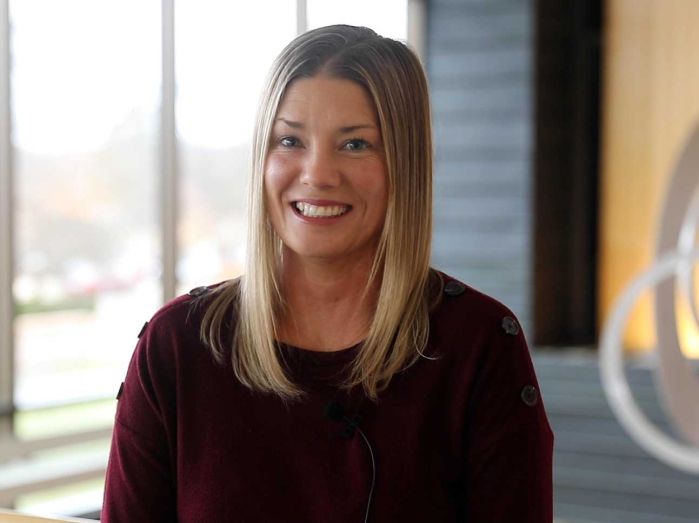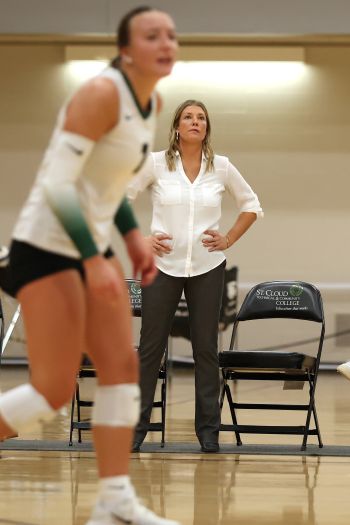
By Kate Wallace
Becoming a member of the Minnesota Army National Guard was not the plan. But SCTCC instructor and Cyclones Volleyball coach Heidi Smith doesn’t regret it one bit.
“I think sometimes life happens and it's so unexpected. And if we can just take what we're given and take those opportunities and make the best out of them, even though it may not be what we think we want, sometimes it ends up being what we needed.”
The outcome of her mistakenly joining the National Guard has resulted in many friends, meeting her husband, and the direction her life has taken her. And she is happy to share how the experiences she had has made her who she is today.
“I think a lot of us are so afraid to ask. And if we just ask the question, ‘What was your service like,’ or ‘What did you do in the military,’ [veterans] enjoy talking about it,” Smith explained. “My experience as a carpenter helped me with chores around the house and it helped me be able to do things that I didn’t know I was capable of doing. It was an experience that helped with life skills.”
Smith joined the Minnesota Army National Guard as a senior in high school. Knowing the amount of debt that she would have after attending college, she was looking at options to help with costs. She was still debating whether to sign up for the National Guard when the recruiter took her to the office for testing, and while signing papers during physicals and going from office to office, she unintentionally signed the paperwork that officially made her a member of the Army National Guard.
“I was like, what? I’m saying my oath and I’m crying, then angry all the way home. But my personality is like, this was meant to happen for a reason. We’re just going to do this,” emphasized Smith.
She got through basic training successfully and was at the top of her class. She had just started the semester at St. Cloud State when she was activated for Iraq in 2003-2004 as one of the first units when the war was announced by Pres. Bush. There were no bathrooms, no internet, and even no mail for the first couple months; they were the team that built the infrastructure for future units.
After returning from her time in the Middle East, the timing worked out for everything. When her six-year obligation was finished, she decided that she was done.
“I’m so glad I did it, but I was so glad I was done. It was a great experience.”
When her husband, who she met while in the Guard, was deployed to Iraq, it made sense for Smith to go to grad school to get her master’s degree in Sports Management. While a student there, she did a graduate assistantship at Campus Recreation at the College of Saint Benedict, where she had the opportunity to take on the volunteer role of assistant volleyball coach for two years.

“I just loved it. It was something I was passionate about.”
The job market during the recession—when Smith graduated—was really tight, but that didn’t discourage her. She sent out resumes to several places, including SCTCC, and was offered a coaching position at Northland College in Ashland, WI. She and her husband had no children at the time, so she took her camper to a spot on Lake Superior in Ashland while her husband stayed in St. Cloud.
“Take advantage of opportunities when they arise,” Smith said, explaining the decision. “Don't let fear hold you back from doing what you're passionate about.”
Two years later, Smith got a call from John Haller, the SCTCC Athletic Director at the time. She met with him, took a tour of campus, and then accepted the job of Volleyball Coach. She’s been here the 12 years since.
Finding the intentional in the unintentional has been a running theme in Smith’s life, and it’s easy to relate that to the anticipation and unknown during volleyball play. Planning and reacting to plays are expected, but Smith’s coaching philosophy is first and foremost to be a great teammate.
Many athletes come to SCTCC to play volleyball who don’t get a lot of playing time but end up being phenomenal teammates. The support and encouragement those players provide are just as important and contribute to wins just has much as anyone else on the team. It may not be what they wanted or expected to do, but their impact is just as intentional as their teammates’ play on the court.
Being a great teammate is something Smith attributes to her time in the military, where she learned that doing your best, being accountable, and holding your teammates accountable makes for intentional outcomes that are best for the team.
When looking back at how she accidentally signed up for the National Guard, Smith shakes her head and smiles, knowing how awful she felt at the time. But taking that experience and shaping it into something not just manageable, but enjoyable and with some of the best outcomes, is what she’s best at. It shows in her coaching, her directness, and her compassion for others.
Next time you see her, ask her about it.